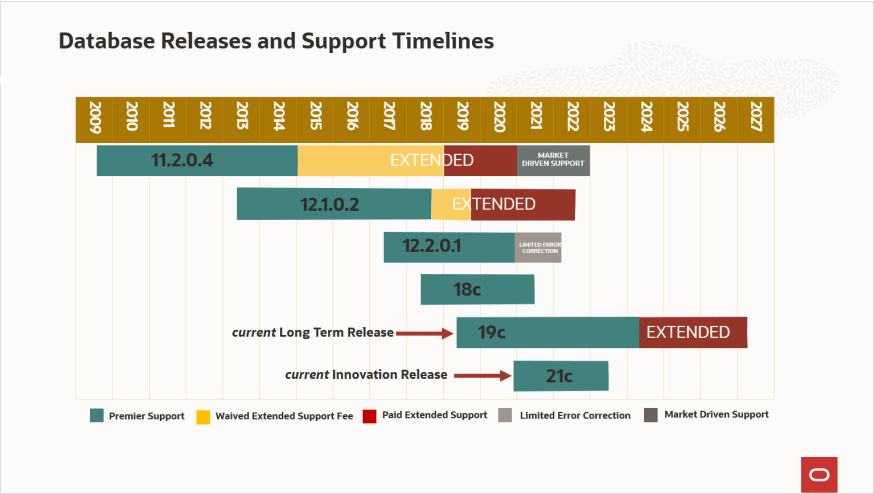Which Oracle Database version is best for your production database ?
11g, 12c, 18c, 19c, 21c … The options are diverse, and the question often arises: which one is preferable for installing or migrating my production databases ?
The short answer is without hesitation : 19c !
However, as is often the case, advice is only valuable when supported by more nuanced and detailed insights, allowing you to make an informed choice. So, let's go for a (slightly) longer version…
Overview of the various versions of Oracle Database (from 11g to 19c)
First, let's review the spectrum of Oracle Database versions, from 11g to 19c. As a picture is often worth a thousand words, let's take a look at Oracle's official support reference :

We are in 2021 (yes, time flies...), and we can easily see that versions 11g and 12c (12.1.0.2 and 12.2.0.1) have well exceeded their "Premier Support" period and only allow fixes in very specific cases (Extended Support, Market Driven Support, both requiring an additional subscription to standard support) and on a limited scope.
Beyond these support issues, other problems arise with these relatively old versions.
For example, 11gR2 will celebrate its 12th birthday this year (which is quite respectable) and can no longer claim to install on the latest versions of operating systems (Linux 8, Windows 2016, and above, in particular).
Even 18c, a more recent version, will see its last fix released in June 2021.
In contrast, 19c is referred to as a "Long Term Release" and will benefit from the most extended support period (at least until 2024 without additional cost).
However, this doesn't mean that you should install or migrate to 19c today and then rest for three years ! Oracle support develops updates every quarter, which should be applied regularly to benefit from the latest feature and security fixes. Here too, vigilance is necessary to avoid accumulating too much technical debt and exposing oneself to undue risks.
Should you consider Oracle Database 21c ?
Finally, the latest version is 21c. Contrary to what one might think, this version will be supported for a shorter time than 19c. Indeed, it is considered an "Innovation Release," not intended for long-term support. It is mainly aimed at customers who want to test the introduction of new features for their applications.
Among these interesting innovations, you can find:
• Support for a new native JSON type in tables
• A new type of table: "Blockchain Tables"
• SQL Macros (more efficient code factorization than traditional functions)
• Simplification of the use of "Machine Learning" type algorithms
• In-Database JavaScript
• Etc.
The integration of technological innovations into the Oracle database is regular, and it is important to adopt them as soon as possible in a highly competitive and evolving context. However, be careful not to rush into 21c without weighing the pros (access to the latest innovations) and cons (limited-time support, need for more frequent updates).
What about Oracle Database 22c and 23c ?
As for the forthcoming versions yet to be unveiled (22c, 23c...), there is very little information currently available about them, even though some sources predict that 23c will be the next "Long Term Release" (just like 19c currently).
All of this will need to be confirmed by Oracle in the coming months, and we will have the opportunity to delve into it in more detail when the time comes.
Regardless of your migration project, DIGORA can assist you, particularly to avoid some unpleasant surprises that may arise if the operation is not sufficiently well-prepared !
